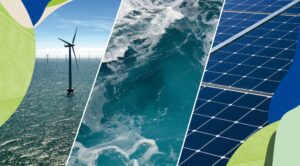This study aims to measure the relationship between technological progress, renewable energy, and green economic growth (GEG). This study uses a data envelopment analysis (DEA) estimation method to evaluate the association between government expenditure on research and development (R&D), renewable energy deployment, and GEG in the Economic Community of West African States (ECOWAS) between 1990 and 2018. The estimates revealed an inconsistent GEG indicator in the analysis, suggesting the lesser impact disposition of public policy. In addition, the energy efficiency ratio of ECOWAS sub-region is under 0.50, implying energy poverty in the sub-region. Many people do not have sufficient energy to heat and cool their homes to enough temperature and meet their basic needs and energy security concerns. This research discovered that a percentage growth increase in renewable energy deployment results in a 3.2% increase in growth in sustainable performance. Alongside an essential effect of one percentage point growth in R&D expenditure boosts economic system sustainable performance to 4.4% combined with a supported effect of one percent. This research reveals that the ECOWAS government expenditure on human resources and R&D of sustainable energy resources would result in a low carbon growth via an advanced technological production process; nevertheless, the impacts are varied in the various countries in ECOWAS.






